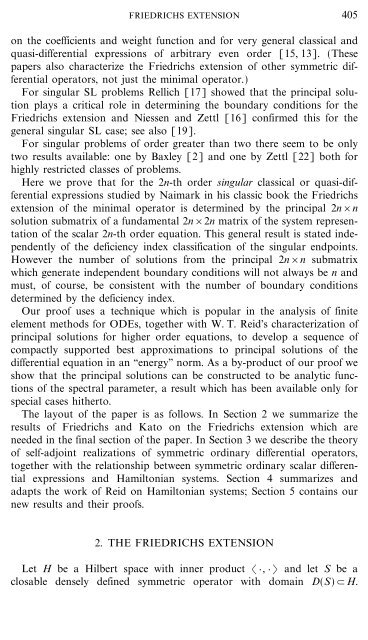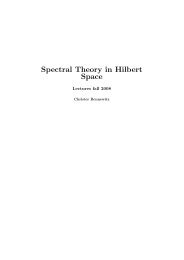The Friedrichs Extension of Singular Differential Operators
The Friedrichs Extension of Singular Differential Operators
The Friedrichs Extension of Singular Differential Operators
You also want an ePaper? Increase the reach of your titles
YUMPU automatically turns print PDFs into web optimized ePapers that Google loves.
FRIEDRICHS EXTENSION<br />
on the coefficients and weight function and for very general classical and<br />
quasi-differential expressions <strong>of</strong> arbitrary even order [15, 13]. (<strong>The</strong>se<br />
papers also characterize the <strong>Friedrichs</strong> extension <strong>of</strong> other symmetric differential<br />
operators, not just the minimal operator.)<br />
For singular SL problems Rellich [17] showed that the principal solution<br />
plays a critical role in determining the boundary conditions for the<br />
<strong>Friedrichs</strong> extension and Niessen and Zettl [16] confirmed this for the<br />
general singular SL case; see also [19].<br />
For singular problems <strong>of</strong> order greater than two there seem to be only<br />
two results available: one by Baxley [2] and one by Zettl [22] both for<br />
highly restricted classes <strong>of</strong> problems.<br />
Here we prove that for the 2n-th order singular classical or quasi-differential<br />
expressions studied by Naimark in his classic book the <strong>Friedrichs</strong><br />
extension <strong>of</strong> the minimal operator is determined by the principal 2n_n<br />
solution submatrix <strong>of</strong> a fundamental 2n_2n matrix <strong>of</strong> the system representation<br />
<strong>of</strong> the scalar 2n-th order equation. This general result is stated independently<br />
<strong>of</strong> the deficiency index classification <strong>of</strong> the singular endpoints.<br />
However the number <strong>of</strong> solutions from the principal 2n_n submatrix<br />
which generate independent boundary conditions will not always be n and<br />
must, <strong>of</strong> course, be consistent with the number <strong>of</strong> boundary conditions<br />
determined by the deficiency index.<br />
Our pro<strong>of</strong> uses a technique which is popular in the analysis <strong>of</strong> finite<br />
element methods for ODEs, together with W. T. Reid's characterization <strong>of</strong><br />
principal solutions for higher order equations, to develop a sequence <strong>of</strong><br />
compactly supported best approximations to principal solutions <strong>of</strong> the<br />
differential equation in an ``energy'' norm. As a by-product <strong>of</strong> our pro<strong>of</strong> we<br />
show that the principal solutions can be constructed to be analytic functions<br />
<strong>of</strong> the spectral parameter, a result which has been available only for<br />
special cases hitherto.<br />
<strong>The</strong> layout <strong>of</strong> the paper is as follows. In Section 2 we summarize the<br />
results <strong>of</strong> <strong>Friedrichs</strong> and Kato on the <strong>Friedrichs</strong> extension which are<br />
needed in the final section <strong>of</strong> the paper. In Section 3 we describe the theory<br />
<strong>of</strong> self-adjoint realizations <strong>of</strong> symmetric ordinary differential operators,<br />
together with the relationship between symmetric ordinary scalar differential<br />
expressions and Hamiltonian systems. Section 4 summarizes and<br />
adapts the work <strong>of</strong> Reid on Hamiltonian systems; Section 5 contains our<br />
new results and their pro<strong>of</strong>s.<br />
2. THE FRIEDRICHS EXTENSION<br />
Let H be a Hilbert space with inner product ( }, }) and let S be a<br />
closable densely defined symmetric operator with domain D(S)/H.<br />
405



